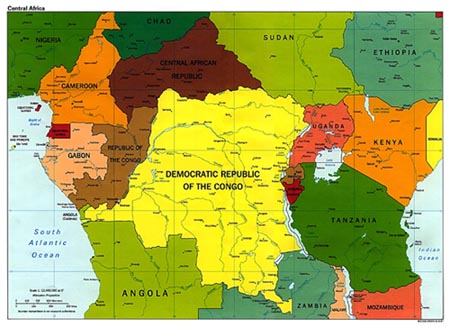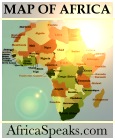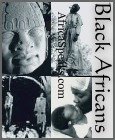The Democratic Republic of Congo
Posted: Friday, April 11, 2003BACKGROUND REPORT (NFTF.org) -- The Democratic Republic of Congo (DRC) is the current incarnation of a state that has been known to history as Congo Free State, Belgian Congo, Congo/Leopoldville, Congo/Kinshasa, and Zaire. It is still known in some circles as Congo-Kinshasa to distinguish it from its neighbor, Republic of Congo, or Congo-Brazzaville. Much of its western border is comprised of the Congo River which it shares with Republic of Congo in an undefined way; no specific agreements have been reached on the division of the river, its islands, or its resources.
This nation of approximately 55 million is in Central Africa surrounded by Republic of Congo, Central African Republic, Sudan, Uganda, Rwanda and Burundi, Tanzania, Zambia, and Angola. There are over 200 African ethnic groups but about 45% of the population is made of three groups who are Bantu and a fourth group that is Hamitic.
DRC is a state endowed with vast potential wealth (gold, diamonds, rubber, copper, cobalt, oil, timber) but its economy has declined significantly since the mid-1980's due a variety of unsuccessful government measures, the residue of colonial rule, and the financial imperialism of new masters.
Its recent history has been one of internal conflict. Much of this arose as the state absorbed large numbers of refugees from the fighting in Rwanda and Burundi in 1994. But the conflicts in the whole region of Central Africa date back as far as the fifteenth century and are today, as they always have been, conflicts of imperialism.
Many of the countries in this area achieved independence from colonial masters in the 1950's and 1960's and quickly degenerated into fighting within and without their borders, much of it spurred by the "financial colonialists" who stepped into the gap left by the old monarchies. The history of these states since the fifteenth century has been one of European colonialism, resistance, independence, followed by neo-colonialism, and prolonged resistance yet again. The primary beneficiary of the new order in this region was the United States who allegedly maneuvered the assassination of Congo's first president, Patrice Lamumba, in 1960. The country's history has been troubled ever since.
President Joseph Mobutu ruled for over 30 years after coming to power in a CIA-aided coup. He is said to have turned over and again to policies and practices that would favor the United States government and business interests over the needs and interests of his people. But rebel groups arose to challenge Mobutu's rule and in 1997 power was seized by Laurent Kabila, a former Marxist who led the Alliance of Democratic Forces. During most of Mobutu's rule the country had been known as Zaire but in May 1997 Kabila formally changed its name to Democratic Republic of the Congo.
On assumption of power, Kabila inherited a country already involved in massive tribal infighting, partly arising because of the influx of refugees in 1994. His rule was quickly challenged by a Rwanda and Uganda backed rebellion in August 1998. Finally, troops from Zimbabwe, Chad, Angola, Namibia, and Sudan intervened to support Kabila's government. Even though a cease-fire was reached in July 1999 between DRC, Zimbabwe, Angola, Uganda, Namibia, Rwanda and the Congolese rebels, sporadic fighting continued unabated. Kabila was assassinated January 16, 2001 and rule of the country fell to his son, Joseph.
Joseph Kabila was successful in negotiating a withdrawal of the Rwandan forces from Congo in October 2002 and early in 2003, all combatant parties finally came to the table and agreed to cease the fighting. They agree to set up a government of national unity as a caretaker until democratic elections can be held in 2005. These will be the first democratic votes cast in this country in over forty years. Remaining Ugandan forces have promised to depart the country by the end of April 2003.
Intertribal conflicts are continuing to erupt periodically, threatening the stability of this fragile peace. As recent as last week, a group of Ituri villagers near the border with Uganda was massacred; early casualty estimates were as high as 1,000 people although this has now been downgraded to between 150-300, according to United Nations observers. Although promises are made to bring the perpetrators to justice, this may be just one more incident in a long history of inter-tribal conflict that will require some careful diplomacy to resolve.
As of April 11, 2003 the peace agreement is holding and the government is beginning its drive toward restoring the infrastructure and social systems of DRC. The nation lost as many as 3.3 million people as a result of the past five years of fighting. At this point, they are anxious to get back on their feet, without the shackles of colonialism.
YellowTimes.org correspondent Paul Harris drafted this report.Printer friendly version
Send page by E-Mail

Previous Page | Zimbabwe Watch | Historical Views | Home
NOTICE: All articles are the copyright property of the writers. In accordance with Title 17 U.S.C., section 107, some material on this site is provided without permission from the copyright owner, only for purposes of criticism, comment, scholarship and research under the "fair use" provisions of federal copyright laws. Visit: http://www.law.cornell.edu/uscode/17/107.shtml for more details. If you wish to use copyrighted material from this site for purposes of your own that go beyond 'fair use', you must obtain permission from the copyright owner.











